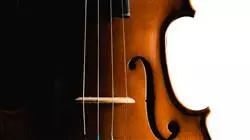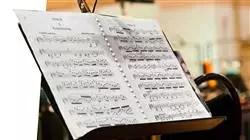University certificate
The world's largest faculty of humanities”
Introduction to the Program
Simon Rattle, Leonard Bernstein, Pierre Boulez, etc. This Professional master’s degree will give you the keys to place yourself at the height of all of them through a comprehensive academic experience and 100% online"

Thinking about orchestration as a compositional process has become a recurring theme in the musical field, especially in the more classical aspects. Thanks to the specialized knowledge in this field, as well as the advances that have been made in terms of the possibility of making increasingly creative and specialized arrangements, musical ensembles have been able to cover a wider range of works, giving the public the possibility of enjoying symphonies that awaken the senses and transport them to numerous scenarios: forests, battles, cities, etc. In this context, the role of the professional who is in charge of the musical ensemble is fundamental, since they are not only in charge, on many occasions, of making the adaptations, but it is also their responsibility to set the tempos, pauses and, in general, the course of the work.
And to enable all those interested in this area to specialize in it, TECH has decided to launch a Professional master’s degree based on Musical Instrumentation and Orchestration. This is an avant-garde and dynamic program through which graduates will be able to delve into aspects such as harmony, notation, vocal repertoire and tuning. Furthermore, they will acquire a broad and specialized knowledge of the piano and the organ as key elements in the creation of pieces, focusing on their history, their characteristics and their employability in today's classical-cultural sector.
For this purpose, the student will have 1,500 hours of diverse content: the syllabus, elaborated by experts in musical direction, practical cases based on real situations and additional high-quality material presented in various multimedia formats. Everything will be available in a state-of-the-art Virtual Campus, which can be accessed through any device with Internet connection, whether it is a PC, Tablet or cell phone and without schedules or on-site classes. In this way, you will be able to combine the program with any other activity, investing your time in mastering your professional skills to become the next Simon Rattle.
You will delve into the different instrument families, as well as the characteristics of each one of them, so that you can carry out standard and complex formations"
This Professional master’s degree in Musical Instrumentation and Orchestration contains the most complete and up-to-date program on the market. The most important features include:
- The development of case studies presented by experts in musical conducting
- The graphic, schematic and practical contents of the book provide technical and practical information on those disciplines that are essential for professional practice
- Practical exercises where self-assessment can be used to improve learning
- Its special emphasis on innovative methodologies
- Theoretical lessons, questions to the expert, debate forums on controversial topics, and individual reflection assignments
- Content that is accessible from any fixed or portable device with an Internet connection
A program with which you will focus your efforts on the knowledge of the basic fundamentals of instrumentation and orchestration through 1,500 hours of theory, practical and additional content”
The program’s teaching team includes professionals from the sector who contribute their work experience to this educational program, as well as renowned specialists from leading societies and prestigious universities.
The multimedia content, developed with the latest educational technology, will provide the professional with situated and contextual learning, i.e., a simulated environment that will provide immersive education programmed to learn in real situations.
This program is designed around Problem-Based Learning, whereby the professional must try to solve the different professional practice situations that arise during the academic year. For this purpose, the student will be assisted by an innovative interactive video system created by renowned and experienced experts.
Specializing in Musical Orchestration had never been so simple and dynamic until TECH decided to launch this academic experience"

Thanks to this Professional master’s degree, you will reach the highest level of coherence and solidity with your compositions and musical arrangements"
Why study at TECH?
TECH is the world’s largest online university. With an impressive catalog of more than 14,000 university programs available in 11 languages, it is positioned as a leader in employability, with a 99% job placement rate. In addition, it relies on an enormous faculty of more than 6,000 professors of the highest international renown.

Study at the world's largest online university and guarantee your professional success. The future starts at TECH”
The world’s best online university according to FORBES
The prestigious Forbes magazine, specialized in business and finance, has highlighted TECH as “the world's best online university” This is what they have recently stated in an article in their digital edition in which they echo the success story of this institution, “thanks to the academic offer it provides, the selection of its teaching staff, and an innovative learning method aimed at educating the professionals of the future”
A revolutionary study method, a cutting-edge faculty and a practical focus: the key to TECH's success.
The most complete study plans on the university scene
TECH offers the most complete study plans on the university scene, with syllabuses that cover fundamental concepts and, at the same time, the main scientific advances in their specific scientific areas. In addition, these programs are continuously being updated to guarantee students the academic vanguard and the most in-demand professional skills. In this way, the university's qualifications provide its graduates with a significant advantage to propel their careers to success.
TECH offers the most comprehensive and intensive study plans on the current university scene.
A world-class teaching staff
TECH's teaching staff is made up of more than 6,000 professors with the highest international recognition. Professors, researchers and top executives of multinational companies, including Isaiah Covington, performance coach of the Boston Celtics; Magda Romanska, principal investigator at Harvard MetaLAB; Ignacio Wistumba, chairman of the department of translational molecular pathology at MD Anderson Cancer Center; and D.W. Pine, creative director of TIME magazine, among others.
Internationally renowned experts, specialized in different branches of Health, Technology, Communication and Business, form part of the TECH faculty.
A unique learning method
TECH is the first university to use Relearning in all its programs. It is the best online learning methodology, accredited with international teaching quality certifications, provided by prestigious educational agencies. In addition, this disruptive educational model is complemented with the “Case Method”, thereby setting up a unique online teaching strategy. Innovative teaching resources are also implemented, including detailed videos, infographics and interactive summaries.
TECH combines Relearning and the Case Method in all its university programs to guarantee excellent theoretical and practical learning, studying whenever and wherever you want.
The world's largest online university
TECH is the world’s largest online university. We are the largest educational institution, with the best and widest online educational catalog, one hundred percent online and covering the vast majority of areas of knowledge. We offer a large selection of our own degrees and accredited online undergraduate and postgraduate degrees. In total, more than 14,000 university degrees, in eleven different languages, make us the largest educational largest in the world.
TECH has the world's most extensive catalog of academic and official programs, available in more than 11 languages.
Google Premier Partner
The American technology giant has awarded TECH the Google Google Premier Partner badge. This award, which is only available to 3% of the world's companies, highlights the efficient, flexible and tailored experience that this university provides to students. The recognition as a Google Premier Partner not only accredits the maximum rigor, performance and investment in TECH's digital infrastructures, but also places this university as one of the world's leading technology companies.
Google has positioned TECH in the top 3% of the world's most important technology companies by awarding it its Google Premier Partner badge.
The official online university of the NBA
TECH is the official online university of the NBA. Thanks to our agreement with the biggest league in basketball, we offer our students exclusive university programs, as well as a wide variety of educational resources focused on the business of the league and other areas of the sports industry. Each program is made up of a uniquely designed syllabus and features exceptional guest hosts: professionals with a distinguished sports background who will offer their expertise on the most relevant topics.
TECH has been selected by the NBA, the world's top basketball league, as its official online university.
The top-rated university by its students
Students have positioned TECH as the world's top-rated university on the main review websites, with a highest rating of 4.9 out of 5, obtained from more than 1,000 reviews. These results consolidate TECH as the benchmark university institution at an international level, reflecting the excellence and positive impact of its educational model.” reflecting the excellence and positive impact of its educational model.”
TECH is the world’s top-rated university by its students.
Leaders in employability
TECH has managed to become the leading university in employability. 99% of its students obtain jobs in the academic field they have studied, within one year of completing any of the university's programs. A similar number achieve immediate career enhancement. All this thanks to a study methodology that bases its effectiveness on the acquisition of practical skills, which are absolutely necessary for professional development.
99% of TECH graduates find a job within a year of completing their studies.
Professional Master's Degree in Musical Instrumentation and Orchestration
Orchestration is a key process in Composition, especially in the classical field. Advances in techniques and expertise have enabled musical ensembles to encompass a wide range of works and create symphonies that evoke varied settings and emotions. Not surprisingly, the role of the professional who directs the ensemble is fundamental to mark the tempos, pauses and development of the work. For those interested in specializing in this area, TECH has launched a Professional Master's Degree in Instrumentation and Musical Orchestration, which offers a broad and detailed preparation in harmony, notation, vocal repertoire and tuning. In fact, students will also master the fundamentals of piano and organ.
Become the next Simon Rattle with this in-depth Professional Master's Degree
The Professional Master's Degree in Instrumentation and Musical Orchestration has 1,500 hours of content, a syllabus developed by experts in Music Direction, case studies based on real situations and additional high-quality material. All this hosted in a Virtual Campus accessible from any device with an Internet connection. Undoubtedly, this program allows students to hone their professional skills and become versed experts in Orchestration, without time or location limitations.







